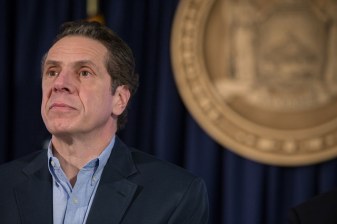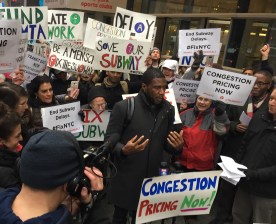Can Congestion Pricing Survive Cuomo’s Political Timidity?
Speaking on WNYC this morning, the governor suggested putting off an Albany vote on congestion pricing until next year.

Governor Cuomo says he wants to pass congestion pricing, but he’s shying away from legislating the policy in Albany this year, and that could spell trouble. Without stronger leadership from the governor now, it’s anyone’s guess whether a good congestion pricing plan will pass in the future.
Speaking on the Brian Lehrer show today, Cuomo said “the congestion in Manhattan is incredible” and made the case for congestion pricing to raise funds for transit improvements. He did not sound like someone who wants to strike while the iron is hot, however.
“There are stages to the congestion pricing,” he said, “and I’m cautiously optimistic that we could start the process” this session.
Lehrer had asked Cuomo about his proposal to compel the city to give the state a share of property tax revenue from areas served by MTA expansion projects. A leaked version of the bill, giving the state broad leeway to define areas where it could essentially seize money from the city, was widely panned as aggressive overreach by the governor.
On WNYC, Cuomo insisted that value capture would only be activated at the behest of the city, and was not a replacement for congestion pricing.
Then he characterized congestion pricing’s chances in Albany as “tenuous at best” and said he doesn’t expect it to pass in “one fell swoop.”
Cuomo’s comments align with a report in Crain’s on Sunday that he’s looking to get the deployment of congestion toll technology funded this session, leaving the hard part — legislating the actual toll — for next year, after the state elections in November.
It’s a timid calculation. The idea is to lower the political risk for legislators (and Cuomo) by avoiding a tough vote before election season. But it raises the risk that Albany will fail to enact good congestion reduction policy.
Assembly Democrats have already put forward a weak substitute that would add a small surcharge on for-hire vehicle trips without setting up a cordon toll for other car and truck traffic. If Cuomo doesn’t insist on legislating the cordon toll as part of this year’s package, it’s possible Albany will pass the taxi/Uber fee now and never get around to the centerpiece of congestion pricing.
Dragging the process out for another year also creates its own political risks.
The experience of other cities shows that people support congestion pricing after they see it in action. That’s what happened in Stockholm, where a six-month demonstration period won over a skeptical public. After congestion pricing cut traffic 20 percent, 52 percent of Stockholm residents voted to make it permanent in 2006. By 2011, public support stood at nearly 70 percent.
The flipside is that public support deteriorates the longer people debate congestion pricing without seeing it work. If Cuomo puts off a vote for another year, he runs the risk of letting opposition to congestion pricing intensify and harden, making passage in the legislature less likely than it is today.



